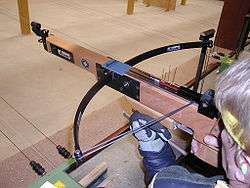kusza
See also: kuszą
Hungarian
Etymology
Of uncertain origin. Either from an unattested verbal stem with -a participle suffix, or back-formation from kuszál (“to tangle”).[1]
Pronunciation
- IPA(key): [ˈkusɒ]
- Hyphenation: ku‧sza
Adjective
kusza (comparative kuszább, superlative legkuszább)
Declension
| Inflection (stem in long/high vowel, back harmony) | ||
|---|---|---|
| singular | plural | |
| nominative | kusza | kuszák |
| accusative | kuszát | kuszákat |
| dative | kuszának | kuszáknak |
| instrumental | kuszával | kuszákkal |
| causal-final | kuszáért | kuszákért |
| translative | kuszává | kuszákká |
| terminative | kuszáig | kuszákig |
| essive-formal | kuszaként | kuszákként |
| essive-modal | — | — |
| inessive | kuszában | kuszákban |
| superessive | kuszán | kuszákon |
| adessive | kuszánál | kuszáknál |
| illative | kuszába | kuszákba |
| sublative | kuszára | kuszákra |
| allative | kuszához | kuszákhoz |
| elative | kuszából | kuszákból |
| delative | kuszáról | kuszákról |
| ablative | kuszától | kuszáktól |
References
- Zaicz, Gábor. Etimológiai szótár: Magyar szavak és toldalékok eredete (’Dictionary of Etymology: The origin of Hungarian words and affixes’). Budapest: Tinta Könyvkiadó, 2006, →ISBN
Polish

kusza
Pronunciation
- IPA(key): /ˈku.ʂa/
Audio (file)
Declension
Synonyms
Derived terms
Further reading
- kusza in Polish dictionaries at PWN
This article is issued from
Wiktionary.
The text is licensed under Creative
Commons - Attribution - Sharealike.
Additional terms may apply for the media files.